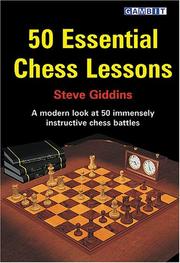| Listing 1 - 4 of 4 |
Sort by
|

ISBN: 1904600417 9781904600411 Year: 2006 Publisher: London Gambit
Abstract | Keywords | Export | Availability | Bookmark
 Loading...
Loading...Choose an application
- Reference Manager
- EndNote
- RefWorks (Direct export to RefWorks)
Analyzes the moves of fifty chess matches and examines what can be learned from each game, discussing attacking the king, defense, piece power, pawn structure, and endgame themes.

ISBN: 1591583586 Year: 2006 Publisher: Westport, Conn. : Teacher Ideas Press,
Abstract | Keywords | Export | Availability | Bookmark
 Loading...
Loading...Choose an application
- Reference Manager
- EndNote
- RefWorks (Direct export to RefWorks)
Chess for children. --- Chess --- Echecs (jeu) --- Study and teaching. --- Étude et enseignement

ISBN: 9780812239447 081223944X 1322510377 0812201043 Year: 2006 Publisher: Philadelphia : University of Pennsylvania Press,
Abstract | Keywords | Export | Availability | Bookmark
 Loading...
Loading...Choose an application
- Reference Manager
- EndNote
- RefWorks (Direct export to RefWorks)
The game of chess reached western Europe by the year 1000, and within several generations it had become one of the most popular pastimes ever. Both men and women, and even priests played the game despite the Catholic Church's repeated prohibitions. Characters in countless romances, chansons de geste, and moral tales of the eleventh through twelfth centuries also played chess, which often symbolized romantic attraction or sexual consummation. In Power Play, Jenny Adams looks to medieval literary representations to ask what they can tell us both about the ways the game changed as it was naturalized in the West and about the society these changes reflected. In its Western form, chess featured a queen rather than a counselor, a judge or bishop rather than an elephant, a knight rather than a horse; in some manifestations, even the pawns were differentiated into artisans, farmers, and tradespeople with discrete identities. Power Play is the first book to ask why chess became so popular so quickly, why its pieces were altered, and what the consequences of these changes were. More than pleasure was at stake, Adams contends. As allegorists and political theorists connected the moves of the pieces to their real-life counterparts, chess took on important symbolic power. For these writers and others, the game provided a means to figure both human interactions and institutions, to envision a civic order not necessarily dominated by a king, and to imagine a society whose members acted in concert, bound together by contractual and economic ties. The pieces on the chessboard were more than subjects; they were individuals, playing by the rules.
Literature, Medieval --- Chess in literature. --- Chess --- Littérature médiévale --- Echecs (Jeu) dans la littérature --- Echecs (Jeu) --- History and criticism. --- History. --- Histoire et critique --- Histoire --- Chess in literature --- History --- History and criticism --- Literature. --- Medieval and Renaissance Studies.
Book
Abstract | Keywords | Export | Availability | Bookmark
 Loading...
Loading...Choose an application
- Reference Manager
- EndNote
- RefWorks (Direct export to RefWorks)
Iconography --- Sculpture --- Drawing --- drawing [image-making] --- paradise [doctrinal concept] --- religions [belief systems, cultures] --- self-portraits --- equestrians --- nudes [representations] --- pregnancy --- chess sets --- cocks [birds] --- Equus caballus [species] --- explosions --- heads [representations] --- sculpting --- dood --- portraits --- women [female humans] --- children [people by age group] --- vier seizoenen --- Adam en Eva --- gevecht met de engel --- Peter [Apostle] --- Daphne [Mythological character] --- Eros [Mythological character] --- Joan of Arc --- Gogh, van, Vincent --- Sterck, Gabriel --- Rembrandt --- Netherlands
| Listing 1 - 4 of 4 |
Sort by
|

 Search
Search Feedback
Feedback About UniCat
About UniCat  Help
Help News
News